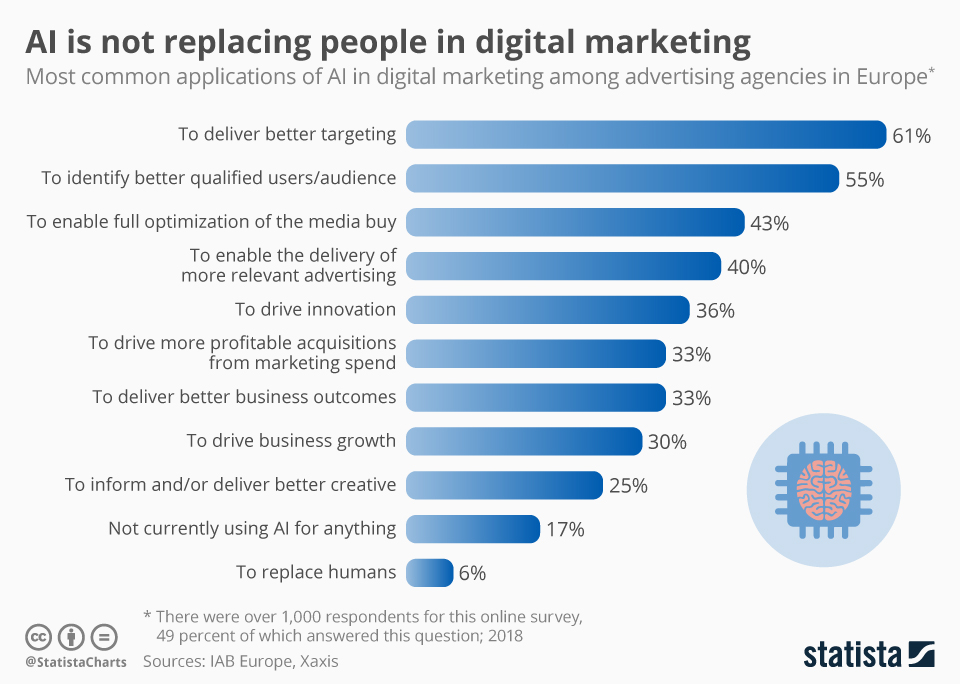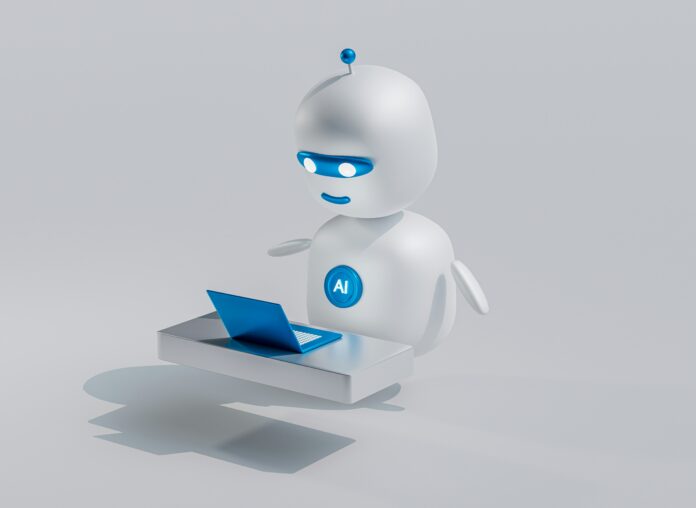Overwhelmed by the rising wave of Automation and AI? You’re not alone. The fear of job security replacement by AI is a concern that resonates across all professional domains, particularly in areas like marketing.
Is it possible that AI could replace marketing? In a strict sense, the answer is no. While Artificial Intelligence can certainly automate areas of marketing such as data analysis and customer segmentation, it lacks the emotional intelligence required to truly empathize with customers and cater to their unique needs. According to Forbes, “AI will probably always lack the emotional intelligence to handle interpersonal relationships which is the key to personal and professional marketing success.”
Yet there’s so much more to uncover. Can AI instead augment marketing strategies? What aspects of marketing can AI handle effectively, and which ones will remain human-centric? Dive deeper into our informative discourse as we explore how AI is revolutionizing the marketing landscape, its limitations, potential for strategic enhancements and its envisaged future role.
The Emergence of AI in Marketing
As technology continues to advance, marketing strategies evolve along with it. The advent of Artificial Intelligence (AI) has already propelled a paradigm shift in marketing, reshaping the traditional marketing landscape and enabling businesses to target customers more effectively.
Overview of AI development and its influence on marketing strategies
AI has indeed made a significant impact on marketing through its ability to identify patterns, trends, and insights from a vast amount of data. AI’s ability to analyze user behavior and search patterns, utilizing data from social media platforms and blog posts, helps businesses understand how their customers use their products.
This data-driven marketing approach not only offers efficiency and scale that was previously unattainable but also allows for more personalization in customer interactions. It can enhance customer segmentation, optimize marketing mix modeling, and significantly improve conversion rates.
The role of AI in automating data-driven marketing decisions
The role of AI in automating marketing decisions is pivotal, particularly in areas where data analysis dominates. AI technologies can automate labor-intensive tasks such as customer segmentation, product recommendation algorithms, predictive analysis, and even content generation, freeing up marketers to focus on strategy and creativity.
However, the power of AI extends beyond these routine tasks. Machine learning, a subset of AI, can predict customer behavior based on past interactions, allowing marketers to customize their offerings and messages accordingly. This dramatically enhances the effectiveness of marketing campaigns.

Source: Statista
Implications for Marketing Job Security
With the rise of AI in marketing, there is growing concern over job displacement among marketing professionals. Specifically, roles that rely heavily on data analysis and repetitive tasks have the most exposure to AI automation.
Discussion of job displacement concerns among marketing professionals
There is a fear that machines might replace humans, especially in areas ripe for AI automation. It’s not an unfounded worry. Yet, while AI can take over routine tasks, true marketing requires a blend of science and art – an area where human creativity still reigns superior.
Analysis of which aspects of marketing AI can automate effectively
AI’s strength lies in its capability to handle large volumes of data at high speed, offering marketers valuable insights. Automation can be effective in areas including customer segmentation, content personalization, predictive analysis, and report generation.
Yet, it’s crucial to remember that AI can only efficiently replace tasks where there are predefined rules and objectives. AI cannot replace functions requiring creativity, intuition, and human connection.
AI’s Limitations in Marketing
Despite its data-crunching prowess, AI has limitations when it comes to emotional intelligence, creativity, and understand nuanced human behavior – an integral part of marketing.
Emotional intelligence and creative thought processes as AI’s shortcomings
As Forbes points out, “AI will probably always lack the emotional intelligence to handle interpersonal relationships which is the key to personal and professional marketing success.” No matter how intelligent a machine gets, it cannot empathize with people or understand the context like humans do.
AI can facilitate the creative process, but it lacks the ability to think abstractly, respond emotionally, or understand humor and satire, which are necessary for crafting truly creative and culturally nuanced marketing campaigns.
Understanding why certain facets of marketing will remain human-centric
While AI can be a powerful tool in a marketer’s arsenal, it is just that – a tool. The human touch is irreplaceable in marketing, especially when it comes to understanding a customer’s needs, motives, and emotions.
Crafting marketing strategies that resonate, building brands, and fostering customer relationships – these are areas where human creativity, intuition, and personal interactions hold sway over AI. The art of persuasion, coaxing customers through storytelling, building emotional connections – these are the facets of marketing that will remain human-centric.
Hence, although AI will continue to play a bigger role in marketing in the future, the human element is and will always be an integral part of the marketing equation. And in this blend of human and artificial intelligence lies the future of marketing.
AI in Data Analysis and Predictive Marketing
The advent of AI in data analysis has created a paradigm shift in the manner marketers execute their strategies. AI algorithms have shown a promising ability to sift through immense datasets to identify trends and patterns that humans would struggle to discern. “AI makes data analysis insights generation and even predictive analytics easier. Your data and reporting will evolve to a significantly new level of sophistication without too much effort or cost,” explains Akkio, a leader in the AI and data analysis realm.

AI’s predictive capabilities are enhancing not just data analysis, but how new marketing strategies are formulated. These algorithms analyze past user behavior to predict future purchasing decisions and marketing trends, allowing companies to tailor their approach accurately. For example, e-commerce giant Amazon employs AI to predict what customers might be interested in purchasing based on their browsing history.
Enhancing Personalization and Customer Engagement
AI isn’t solely about predictive marketing and data interpretations; it’s also pivotal in elevating personalization and customer engagement. Modern AI systems can analyze individual customer preferences and tendencies to craft personalized marketing campaigns, elevating the user experience and boosting customer loyalty. Starbucks, for instance, uses AI to generate personalized drink recommendations directly on its mobile app.
Moreover, AI-driven chatbots have revolutionized customer service, offering immediate, tailored responses to customer queries. These AI assistants process natural language to comprehend the customer’s needs and provide accurate information, drastically improving customer engagement and interaction.
Integrating AI with Human Creativity
Arguably, one of the most important aspects of using AI in a marketing context is the integration of technology with human creativity. While AI deals with real-time data and statistical analysis, human creativity provides the ingenuity that AI currently cannot replicate. Successful marketing initiatives often lie at the intersection of these two forces.
Take content creation, for instance. AI can help identify trending topics and keywords to include but it is the marketer’s craft to weave these into a compelling narrative that resonates with the audience. Similarly, in the world of social media marketing, AI tools can analyze the optimal time to post or the best kind of content that attracts engagement. Yet, it’s the creative minds that generate original content and strategically utilize these insights.
So can marketing be replaced by AI? The answer is a resounding “no” as what AI brings to the table is not a replacement but more of a reliable partner that helps marketers perform their jobs better. By harnessing the power of AI, companies can improve their branding, customer interactions, and overall marketing performance, but the creative, emotional, and strategic aspects of marketing still need the human touch.
Predicting the Long-Term Impact of AI on Marketing
Artificial intelligence is not only here to stay but also set to grow even further. As this expansion continues, many have started to keep an eye on the possible consequences for the world of marketing. With AI’s ability to gather information, analyze situations, and plan actions much faster than any human, it’s undeniable that significant changes are looming on the horizon.

For starters, the traditional procedure for creating marketing strategies and determining budget allocation could be profoundly altered. By using AI’s predictive capabilities to examine past trends and anticipate future desires, organizations can allocate their resources more efficiently, resulting in a sharper, more successful market presence.
Another area set for transformation is customer relationship management. AI can handle tedious jobs, such as sorting through customer complaints and inquiries, providing quick responses, and, most importantly, offering personalized solutions much more promptly than its human counterparts. But that’s not all; in the future, we might witness advanced AV systems [Artificial Intelligence Virtual Assistants] taking the reins, providing technologically sophisticated solutions that are indistinguishable from human-provided services.
As these key changes take place, the role of the marketing professional will undoubtedly shift. This brings us to our next point of discussion.
Developing AI-Resistant Skills in Marketing
The growing prevalence of AI in marketing understandably raises concerns about job security. But rather than seeing AI as a threat, marketing professionals should visit it as an opportunity to develop new skills and adapt to new roles.

According to Martech, “Artificial intelligence is the next technological innovation that will fundamentally shift marketing approaches.” Therefore, professionals must start equipping themselves with AI-resistant skills that add undeniable human value, such as emotional intelligence, creativity, and critical thinking. They need to focus on strategic decision-making, which is heavily influenced by human insight, perspective, and judgment.
To ensure their longevity in this ever-changing landscape, marketers must also learn to collaborate with AI. Expertise in AI applications, collaboration tools, and data interpretation will become increasingly important. Ultimately, the future marketer will need to become an effective manager of both humans and machines.
Ethical Considerations and Marketing Authenticity
As AI’s role becomes more prominent, there’s an underlying need for ethical considerations. Enthusiasm for AI’s efficiency must not lead to negligence towards ethical data usage and maintaining marketing authenticity.
AI manages vast amounts of personal data for targeted marketing strategies, which could pose privacy and security concerns. Marketers should adhere strictly to data regulation laws and prioritize transparent communication with their customers about data usage.
Meanwhile, maintaining marketing authenticity in an AI-dominant world is challenging. While AI can provide highly personalized experiences, there’s always a high risk of losing the human touch and emotional connection that form the cornerstone of successful marketing.
Endeavoring for a balance between AI’s capabilities and human intimacy will crucially define the future of marketing.
Frequently Asked Questions
Could AI replace human marketers eventually?
While AI is excellent at automating routine tasks, marketing also involves creative and intuitive decision-making skills that AI simply cannot replicate. Therefore, while the roles of human marketers might evolve, they cannot be entirely replaced.
What are some skills that can make a marketer “AI-proof”?
Creative thinking, emotional intelligence, complex problem-solving skills, strategic decision-making ability, and expertise in data interpretation can make a marketer more resilient to AI automation.
Does the use of AI lead to ethical concerns in marketing?
Yes, there can be ethical concerns related to privacy, data security, and authenticity. It’s essential for marketers to use AI responsibly and ethically maintain trust with their audience.
How can AI help in budget allocation in marketing?
AI, with its predictive analytics, can analyze past spending patterns and anticipate future marketing scenarios. This can help in making more accurate budget allocation decisions.
Can AI actually write complete marketing strategies?
Although AI can provide valuable insights and trends, the creative and strategic aspects of crafting a marketing strategy still require a human touch. So while AI can contribute significantly, it cannot write an entire marketing strategy on its own.

